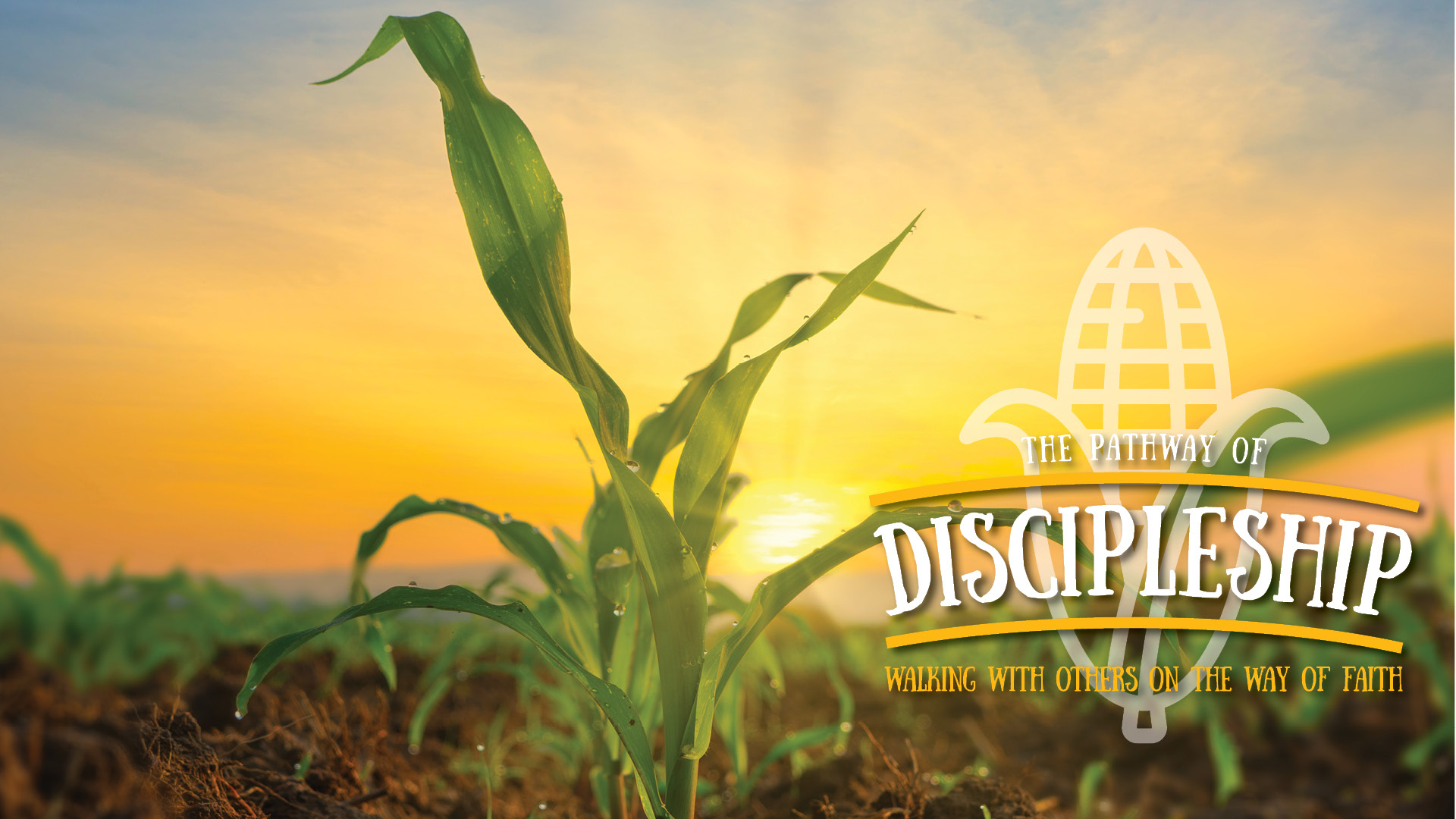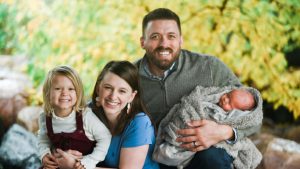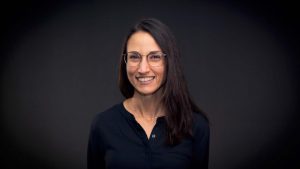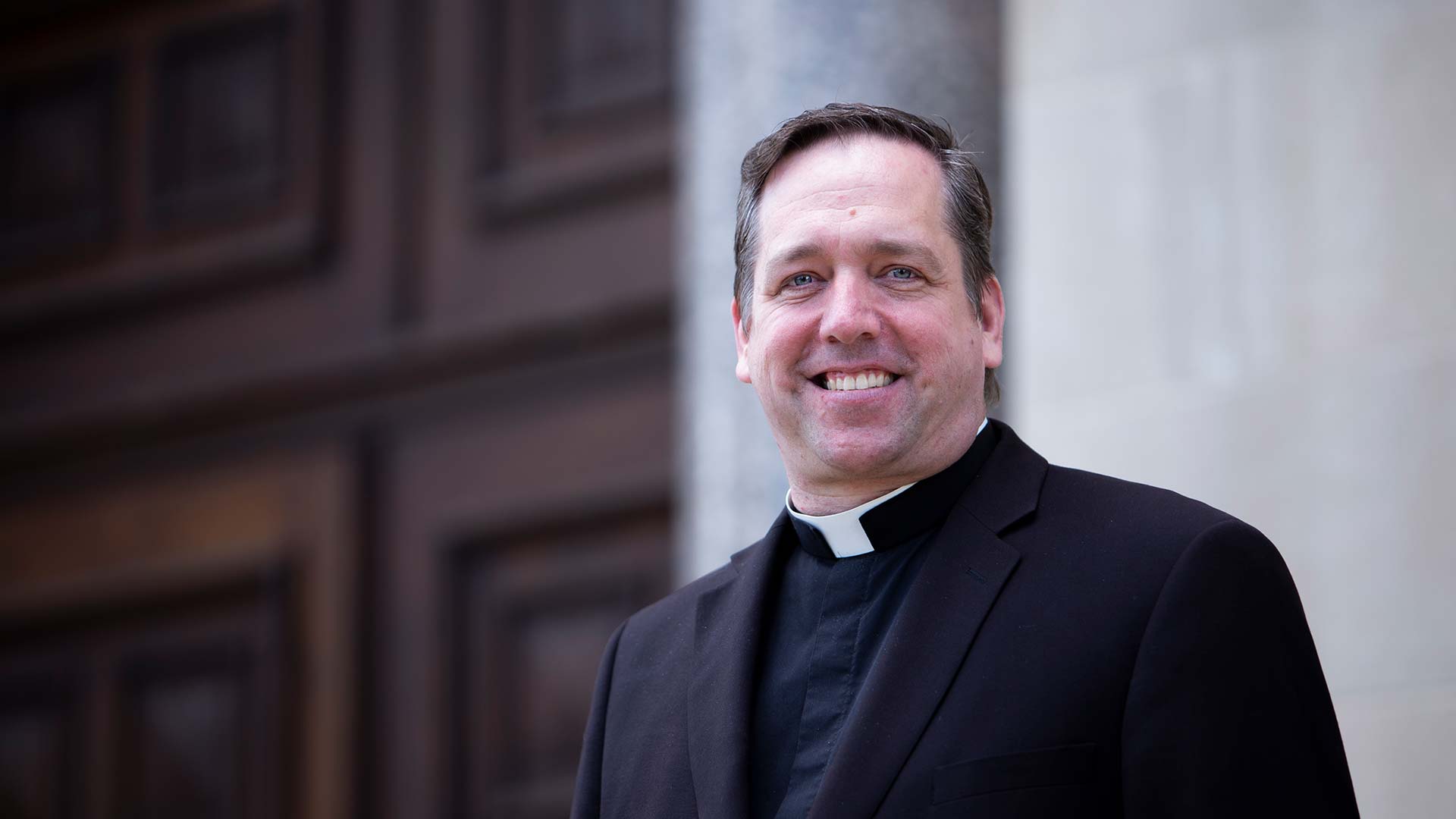
By Laurie Stiegelmeier
Jesus had a mission in mind for his disciples, and at the beginning of Luke chapter 10, he sent the 72 out ahead of him.
He [Jesus] said to them, “The harvest is abundant but the laborers are few; so ask the master of the harvest to send out laborers for his harvest’’ (Luke 10:2).
Nearly 2,000 years later, we are asked to be part of the laborers Jesus is asking for. We are the lifelong Catholic missionary disciples whom Bishop DeGrood is calling to go out, through our Lord’s love.
Pathway of Discipleship
To help us labor more easily and effectively, the Diocese of Sioux Falls is developing a model they are calling the Pathway of Discipleship. These are 11 stages or thresholds of growth in relationship with God that can be summarized with the concepts of win, build and send.
Dr. Chris Burgwald, director of discipleship formation, explained that we want to win people to Jesus, build them up as disciples of Jesus, and send them out to win more disciples for Jesus Christ. “It’s the work of evangelization since the beginning of the Church,” he said, “and we’re all called to do it.”
Father Scott Traynor, vicar for clergy and lay formation, said anything we can do to grow in our relationship with God will help us bring others to God.
“I need to be a disciple to make disciples,” Father Traynor says. “The more I know the Pathway of Discipleship, the more intentional I can be in encouraging others and in befriending others with God’s love. This is the new evangelization: the power of faith coming alive in people’s lives.”

“Everyone should know about the Pathway of Discipleship,” Shane Van Diest of St. Lambert Parish said. “The foundation of all of it is a desire to know, love and serve Jesus Christ. As disciples out in the world, it gives us tools to diagnose what is needed from us or from the Church. All of us will feel promptings from the Holy Spirit, and it can be intimidating to know how to respond; the pathway gives us tools for the desire we feel. It gives language to the process that says every one of us is called to be a missionary disciple.”
Shane also emphasized that the words missionary and disciple must go together—as a missionary we go out and share what we are receiving as a disciple, prompted by the Holy Spirit.
Everyone goes through the 11 stages on the Pathway of Discipleship in the same order, but the time between the steps can vary greatly from person to person and sometimes, due to life events, a person may even go backward or may move forward through more than one in a short time. Father Traynor said since we are all unique and unrepeatable people, our relationship with God is also unique and unrepeatable.
“We all go through the stages at our own pace, and we can go backwards—each person’s experience makes a difference,” Dr. Burgwald said. “When it comes to helping others, it’s more of an art than a science. When I’m helping to deepen people’s relationship with Jesus, I need to have a sense of where they are. It’s like a coach helping someone be a better player—the coach needs to know the level the player is at before they can encourage them to move forward.”
He furthered the analogy with the example that perhaps one player was struggling to dribble the ball while another was scoring 20 points per game. Each would be coached differently; the same is true for spiritual development.

Lumen Christi Formation Coordinator Alaina Cuka said we’re made for community, and we’re challenged to grow through the witness of others. We can use thresholds of conversion as a tool to discern where we are, but we don’t reach a stage of completion; we can waver between stages or go backwards.
“It can be a tool to use to discover where another or we ourselves are in that journey so we can offer a potential next step,” Alaina said.
Shane has had a front row seat watching people become disciples in many different fields. His first opportunity to model discipleship was to male athletes as a football coach at the University of South Dakota. He has worked at the parish level, chancery level, as a FOCUS missionary and in family life and friendship. He said someone is always modeling discipleship for us, and we are modeling for others.
“We don’t stop being discipled when we are discipling,” Shane said. “Part of the genius and wisdom of this language is that we don’t wait to be a pro; there’s humility in knowing that none of us is perfect. And I’ve found it fascinating that we are going to fluctuate back and forth throughout our life.”
[metaslider id=6447]
WIN
The first stage, in which a person likely has no connection with an individual Catholic or the Church and may have suspicion or outright hostility toward Catholicism, is Pre-Trust. Father Traynor advises building trust through attentiveness and kindness.
“Be reliable, consistent and available. Be a good human being,” he said. “Take a sincere and unrelenting interest in others. Listen for how God is trying to work in their lives. But remember that only God can move a person from one step to the next step. Our job is to create a favorable environment for the person to receive this grace from God.”
Father Traynor finds opening conversations with “tell me about your experience of God” has been fruitful; people don’t seem intimidated by it and will share. He then takes a sincere interest in their response to how they are receiving God’s initiative of love. He cautions that we should always have reverence and humility in our interest in a person’s deepening relationship with God.

“That’s the nature of love, to know and care about others,” he said. “We need to ask God to give us a supernatural love for those we meet.”
When a person has a positive association with Jesus, the Church, Catholic schools, or a Catholic, they grow into the Trust stage. This may lead to Curiosity. At this threshold a person is intrigued or desires to know about Jesus or his teachings but is not yet open to change. Curiosity can only happen when trust is achieved, but it is a passive stage because the person is not yet open to change.
Openness is an admission to a general need or desire for personal and spiritual change but does not imply a commitment to specific changes. When a person moves from being passive to actively trying to know the God who is calling him or her and is engaged in a spiritual quest, the threshold of Seeking has been reached.
BUILD
The Decision is made in faith to follow Jesus as an obedient disciple in the Church. This brings about a new life and marks a major turning point in the life of a disciple. The person who has reached the decision stage is won for Christ and is ready to be built up through this and the next two steps on the Pathway of Discipleship.
A Beginning Disciple starts to follow Jesus, begins turning from sin and has a strong desire to grow spiritually. A Growing Disciple develops a heart for God and is willing to make sacrifices to personally grow. He or she lives the habits of the Christian life.
“The pathway of discipleship is a tool to assist someone to be a better disciple; we need to learn to know what to provide to further someone’s growth,” Shane said. “In the early stages, we need to continue to earn trust and show people what Jesus and the Church are about. Further along, people need tangible opportunities to live their relationship with Jesus, to serve and share. This might be asking them to lead a Bible study and helping them to share the Gospel message.”
SEND
A Commissioned Disciple has decided to personally answer the call to take part in the mission of the Church by sharing the Good News and is ready to be sent out to do so. In Mark’s Gospel, the man freed from possession by a legion of demons is an example. After driving out the unclean spirits, “Jesus told him to ‘go home to your family and announce to them all that the Lord in his pity has done for you.’ Then the man went off and began to proclaim in the Decapolis what Jesus had done for him; and all were amazed” (Mark 5:19-20). After Pentecost, the apostles and disciples won, built and sent more missionary disciples into the world by boldly proclaiming what they had witnessed in their relationship with Jesus.
Sent out to evangelize, a Disciple-Maker has helped another person to commit their life to Jesus as a disciple and is willing to make sacrifices to help another person to grow spiritually. Finally, when a person is fully equipped for lifelong Catholic mission and has helped others become disciple-makers, who in turn have produced a strong third generation of disciples, they have become a Spiritual Multiplier. This person wants to give as a gift the gift they were given.
These identifiable stages or mile-markers exist, and we all go through them. “Not everyone arrives at the last stage of spiritual multiplier in their lifetime, but we’re all called to it and called to help one another to it,” Dr. Burgwald said.
Walking with others
In training the missionary disciples of Lumen Christi, Alaina focuses on the thresholds of conversion as a tool for those who desire to evangelize others and to meet people where they are on their journey to Christ.
“It’s a way to check ourselves to make sure we’re asking questions and offering suggestions that allow us to walk with people rather than dragging them along or pushing them to where we think they should be,” Alaina said. “We need to understand where Christ is leading them.”
The idea of walking with people on the Pathway of Discipleship is repeated by Dr. Burgwald.
“I love Luke’s account of the road to Emmaus,” Dr. Burgwald said. “Jesus walks with the disciples in their journey. Before he tells them anything, he asks questions. Before that, he listens, and before that he walks with them. It’s an art, a skill we can grow in; practice makes perfect. The more time you spend listening intentionally, the better you get at it.”
“I don’t talk about what I want to talk about,” Father Traynor said. “I listen so I know what we talk about, who I refer them to, what book I put in their hand.”
Dr. Burgwald, Father Traynor, Alaina and Shane all emphasize that the pathway of conversion is not about labeling people or categorizing them. It’s about helping them make the next step. It’s about how we can best serve someone one-on-one in relationship with the love of Christ.
“The main pushback I get is that we’re putting people in a box, labeling them,” Alaina said. “This is not a labeling system; the goal is always to encounter people to help them have a deeper relationship with Jesus.”
Labeling can go the other way. We may assume that people who always attend Mass or go to Bible study are further along the pathway than they are. Alaina said knowing the thresholds of conversion is important.
“It’s a good accountability tool for focusing on the other person and truly encountering them and training ourselves to meet them where they are,” Alaina said.
It is important to know that knowledge of the Pathway of Discipleship and the work of evangelization is not reserved for priests or for people in charge of faith groups or those who work in faith-formation positions within the Church. It is the work of every baptized Christian. We are each called by our baptism to increase the harvest, to help our brothers and sisters in Christ grow in their love for God so we all may reach the eternal happiness of heaven.
“It’s the path we’re all on—to become fruitful disciples helping others to be fruitful disciples,” Dr. Burgwald said. “Ask God to show you where people are, and how to help them move along the pathway to greater discipleship. God gives the growth, but I can cultivate the soil, fertilize, water and make favorable conditions for God’s grace.”


